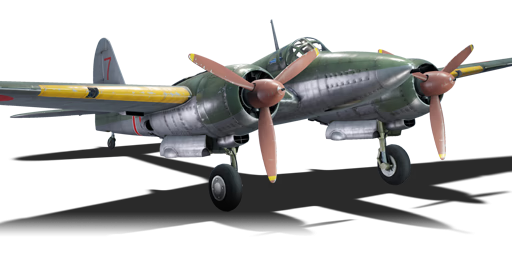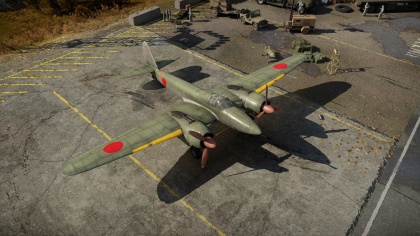Ki-108 Kai
Contents
Description
The Ki-108 Kai is a Rank III Japanese twin-engine fighter
with a battle rating of 3.7 (AB/RB) and 3.3 (SB). This aircraft was introduced in Update 1.77 "Advancing Storm".
General info
Flight Performance
| Characteristics | |||||||
|---|---|---|---|---|---|---|---|
| Stock | |||||||
| Max Speed (km/h at ?,000 m) |
Max altitude (meters) |
Turn time (seconds) |
Rate of climb (meters/second) |
Take-off run (meters) | |||
| AB | RB | AB | RB | AB | RB | ||
| ? | ? | 13000 | ??.? | ??.? | ??.? | ??.? | ??? |
| Upgraded | |||||||
| Max Speed (km/h at ?,000 m) |
Max altitude (meters) | Turn time (seconds) | Rate of climb (meters/second) |
Take-off run (meters) | |||
| AB | RB | AB | RB | AB | RB | ||
| ? | ? | 13000 | ??.? | ??.? | ??.? | ??.? | ??? |
Details
| Features | ||||
|---|---|---|---|---|
| Combat flap | Take-off flap | Landing flap | Air brakes | Arrestor gear |
| X | X | X | X | X |
| Limits | ||||
|---|---|---|---|---|
| Wing-break speed (km/h) |
Gear limit (km/h) |
Combat flap (km/h) |
Max Static G | |
| + | - | |||
| 0 | 310 | ??? | ~?? | ~? |
| Optimal velocities | |||
|---|---|---|---|
| Ailerons (km/h) |
Rudder (km/h) |
Elevators (km/h) |
Radiator (km/h) |
| < ??? | < ??? | < ??? | > ??? |
| Compressor (RB/SB) | ||
|---|---|---|
| Setting 1 | ||
| Optimal altitude | 100% Engine power | WEP Engine power |
| ?,??? m | ??? hp | ?,??? hp |
Survivability and armour
Examine the survivability of the aircraft. Note how vulnerable the structure is and how secure the pilot is, whether the fuel tanks are armoured. Describe the armour, if there is any, also mention the vulnerability of other critical aircraft systems.
Armaments
Offensive armament
Describe the offensive armament of the aircraft, if any. Describe how effective the cannons and machine guns are in a battle, and also what belts or drums are better to use. If there is no offensive weaponry, delete this subsection.
Usage in battles
Describe the tactics of playing in an aircraft, the features of using vehicles in a team and advice on tactics. Refrain from creating a "guide" - do not impose a single point of view, but give the reader food for thought. Examine the most dangerous enemies and give recommendations on fighting them. If necessary, note the specifics of the game in different modes (AB, RB, SB).
Manual Engine Control
| MEC elements | ||||||
|---|---|---|---|---|---|---|
| Mixer | Pitch | Radiator | Supercharger | Turbocharger | ||
| Oil | Water | Type | ||||
| Controllable | Not controllable | Not controllable | Not controllable | Separate | Not controllable | Not controllable |
Modules
| Tier | Flight performance | Survivability | Weaponry | ||
|---|---|---|---|---|---|
| I | Fuselage Repair | Radiator | |||
| II | Compressor | Airframe | |||
| III | Wings Repair | Engine | |||
| IV | Engine Injection | Cover | |||
Pros and cons
Summarize and briefly evaluate the vehicle in terms of its characteristics and combat effectiveness. Mark its pros and cons in the bulleted list. Try not to use more than 6 points for each of the characteristics. Avoid using categorical definitions such as "bad", "good" and the like - they have a substitution in the form of softer "inadequate", "effective".
Pros:
Cons:
History
Development of the Ki-108 began in April 1943 after Kawasaki wanted to fulfil a standing requirement with the Japanese Army for a heavy interceptor that initially began with the Ki-45 heavy fighter series. The Ki-108’s design was derived mostly from the previous Ki-102 project and took some elements of the Ki-96 as well, effectively combining the two designs into one. After the first B-29 Superfortress bombers made their appearance over the Japanese home islands, the need for such a high-altitude interceptor became even more emphasized. Two Ki-102 otsu airframes were taken from the assembly line in 1944 to produce the initial Ki-108 prototypes. Compared to the Ki-102, which was intended as a low-altitude attack aircraft, the Ki-108 was an interceptor meant for high altitude operations. To allow for this, the Ki-108’s cockpit had to be significantly reduced in size and was to be hermetically sealed. This effectively turned the Ki-108 into a single-seater, reduced weight and decreased the strain on the engines all at the same time, which allowed for better performance at higher altitudes.
The two initial prototypes were completed in July and August 1944, respectively. An improved version of the Ki-108 was designed based around the Ki-102 Hei, featuring a wider wingspan and a longer fuselage, in an effort to improve high-altitude handling. Two examples of the Ki-108 Kai variant were built and subsequently tested in 1945. However, the worsening war situation for Japan prematurely concluded testing of the type and both versions never left prototype stage, yet alone seeing combat. A total of four Ki-108s were manufactured between 1944 - 1945.
- From Devblog
Media
An excellent addition to the article will be video guides, as well as screenshots from the game and photos.
See also
Links to the articles on the War Thunder Wiki that you think will be useful for the reader, for example:
- reference to the series of the aircraft;
- links to approximate analogues of other nations and research trees.
External links
| Japan twin-engine fighters and strike aircraft | |
|---|---|
| Navy | |
| Land-based Fighter | |
| J1N | J1N1 |
| J5N | J5N1 |
| Army | |
| Ki-45 | Ki-45 ko · Ki-45 otsu · Ki-45 hei · Ki-45 tei |
| Ki-83 | Ki-83 |
| Ki-96 | Ki-96 |
| Ki-102 | Ki-102 otsu |
| Ki-108 | Ki-108 Kai |
| Ki-109 | Ki-109 |





